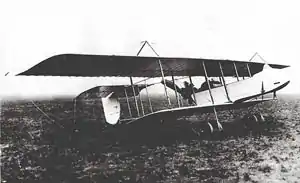| HF.6 | |
|---|---|
 | |
| Role | Reconnaissance aircraft |
| Manufacturer | Farman |
| Designer | Henri Farman |
| First flight | June 1911 |
The Farman HF.6 was a reconnaissance aircraft built in France shortly before the First World War.
The HF.6 would later be developed into the more advanced Farman HF.14, which differed from the former in having a more streamlined horizontal stabilizer and an oval rudder.[1]
Specifications
Data from [2]
General characteristics
- Crew: 2 (pilot and observer)
- Length: 9.00 m (29 ft 6 in)
- Wingspan: 11.00 m (36 ft 1 in)
- Wing area: 21 m2 (230 sq ft)
- Empty weight: 350 kg (772 lb)
- Max takeoff weight: 550 kg (1,213 lb)
- Powerplant: 1 × Gnome 7-cylinder air-cooled rotary piston engine, 37 kW (50 hp)
- Propellers: 2-bladed fixed-pitch wooden pusher propeller
Performance
- Maximum speed: 90 km/h (56 mph, 49 kn)
- Range: 315 km (196 mi, 170 nmi)
- Wing loading: 26.1 kg/m2 (5.3 lb/sq ft)
- Power/mass: 0.09 hp/kg
References
- ↑ "Farman HF.14".
- ↑ Premiers Farmanhydroretro.net Archived 2020-10-22 at the Wayback Machine
Bibliography
- Liron, Jean (1984). Les avions Farman. Collection Docavia. Vol. 21. Paris: Éditions Larivière. OCLC 37146471.
This article is issued from Wikipedia. The text is licensed under Creative Commons - Attribution - Sharealike. Additional terms may apply for the media files.